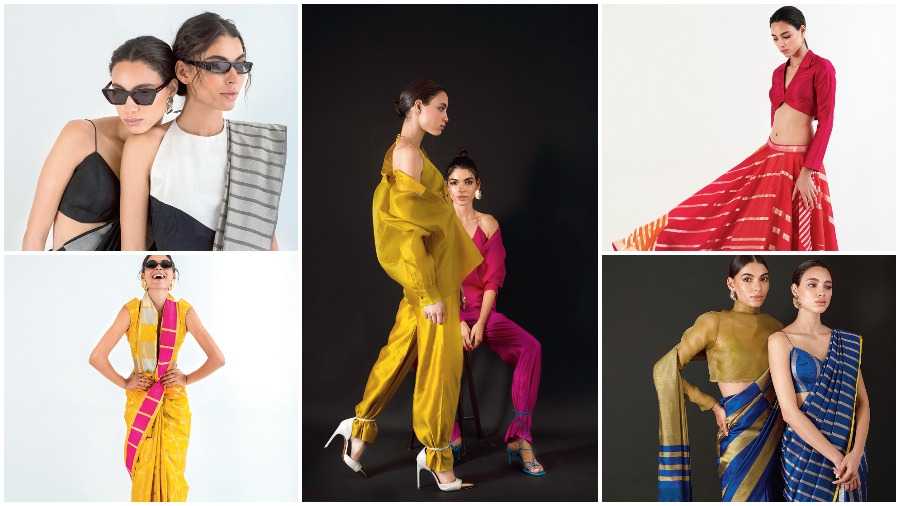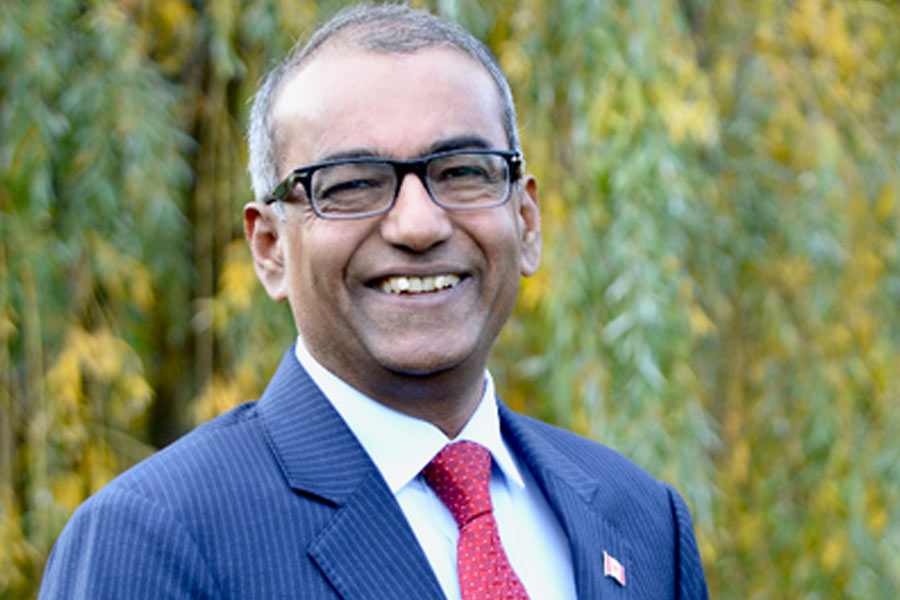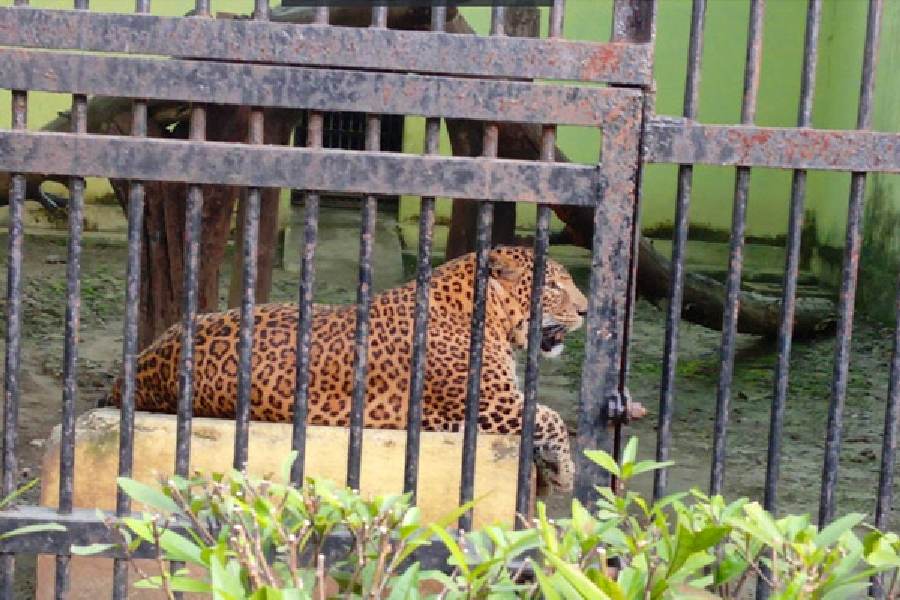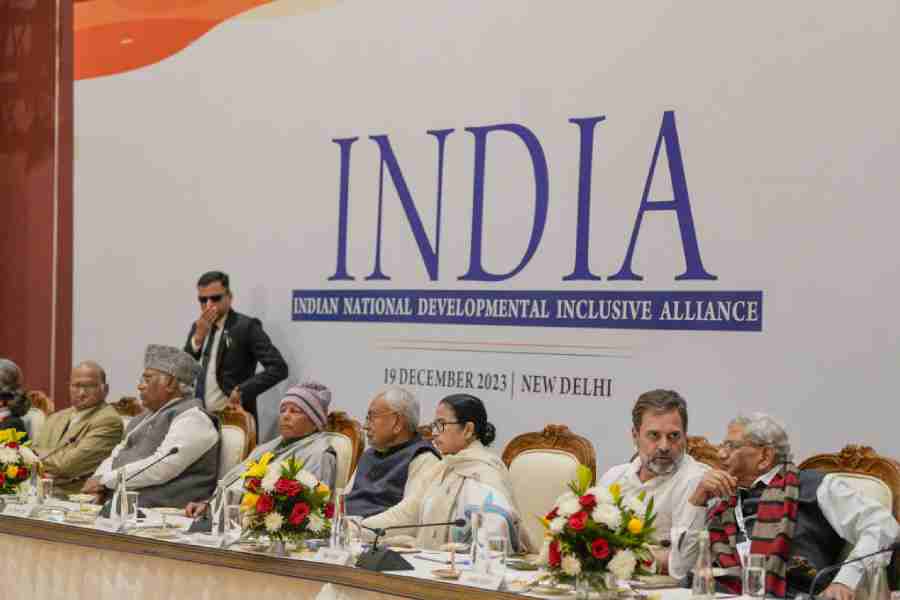Palak Shah, CEO and founder, Ekaya Banaras, is one amazing woman. Cooperative, understanding, strong and oh-so-inspirational. When our initial interview file got corrupted, Palak was generous enough to suggest a re-interview. All in between attending a series of meetings. You have our heart, Palak!

Sourced by the correspondent
In this The Telegraph chat, Palak spoke about Ekaya Banaras’ SS’21 collection: Arohi X Ekaya, a collaboration with her sister Aarohi Shah. Saris, suits, bias-cut skirts and organza co-ord sets make up the bold and beautiful collection.
This time you have collaborated with your sister...
This collection is actually by my sister. She graduated from FIT (Fashion Institute of Technology), New York. Ekaya loves to collaborate with people who have never worked with textiles before, which gives room to us to innovate because they tend to ask questions which are never asked before and a lot of new products come in. Sometimes there might be a lot of wisdom in those stupid questions and there might be a lot of innovations in those stupid questions.
My sister’s graduation project consisted of doing trench coats, anti-fit products, very western.... She worked with Oscar de la Renta and White Label by Proenza Schouler. When we asked her to create something with textiles, her first reaction was ‘no’. She said she doesn’t know textiles and we said it was all the more reason to create it because when you do create with a form you didn’t know, you can come with excellent results.
And, hence came this collection, which looks very simple, but is very complicated to create because simple is more difficult. We are wired to create more and more, but sometimes less is more. The simpler the product, the better it is actually. Nobody is creating simple stuff. The young love minimalist (designs).
The collection has beautiful colours. My sister is a painter and she loves to paint and loves to play with colours and that’s been a very integral part of who she is. So she has played with colours. She doesn’t understand flora and fauna and jangla.... She wanted to create something for girls her age where they felt confident wearing something. So, it’s stripes and colours.
Versatility is at the core of the brand...
It is of course at the core of what we do and we always try to create something different, try to shock not just our audience, but also our weavers. Once you create a versatile product, you are keeping your weavers on their toes. Anyone in a certain trade will get bored if there is no innovation.
How do the weavers react?
They are very stunned and they’ll ask ‘yeh bikega?’ When we were trying to create reverse garments, they were like ‘What? Reverse?’ I, however, think they have so much faith in us because Ekaya has gone from one place to another.
What has your journey with saris been like?
The sari needs to be catered to today’s generation. That’s where the money is. You asked me why the saris went away. It’s because no one innovated or did something to uplift it. Everyone held on to their traditions so tightly and the product became old. Even today we are creating a tradition for the future. So, tradition needs to be adapted and so does the product. The youth is deciding and even for my mom... we decide for each other.
What are your favourite saris?
I love textiles... Benarasi textiles. I have tried to wear Kanjeevaram. I am old-school and I love the untreated sari. I am going to pick up something from Aarohi’s collection because I love the colours. In fact, I have done a shoot for her as well and I was telling her that I am going to pick up half the things. They are modern, light and airy. I have all my dadi’s collections, like her Pitambaris and her zari saris. She wore printed saris, but when she stepped out, she wore some stunning real zari saris.
Has your father (Bharat Shah) adapted to the changes now?
He is a very adaptable human being and he is also so ambitious and on-board with my mission to change the way Indian textiles are looked upon, that it makes my journey very exciting.
You started the brand after college. Being a woman, what has it taken for you to be in a commanding position in the patriarchal world of karigars?
You know, I feel like anyone who is hard-working and knows her thing, I don’t think it’s ever a problem. I have never faced a pushback from my family and they have been gung-ho about all my plans. Or, even my weavers. I feel you’ve got to show results for them to trust you. I have spent sleepless nights getting things done and have worked harder than most people and I continue to do so.
Though you come from a textile family, you have charted your own path. What is your tip for anyone looking to start out on his or her own?
First you have to lose the fear of falling down because you will fall down. I was mentoring someone the other day and she asked me what she can do to avoid challenges for reaching success quickly or the challenges I have faced. I told her there is no way you can avoid any challenge. Everyone’s challenges are tailor-made. You have to go through that journey.
Who are your favourite women?
There are two women I admire. One is my dadi... unfortunately, she is no more. She has always pushed me to work. Even at the age of 70 that woman did not stop learning. She learnt Photoshop at the age of 70 and trading in stocks. Constantly in her room there would be business channels on. She would constantly try to learn. I don’t remember my dadi ever not learning. That’s something my dad gets from my dadi and I hope I too get it from my dadi. Always defying age and boundaries. I am fascinated with Princess Diana. She was a people’s person and so relatable.











